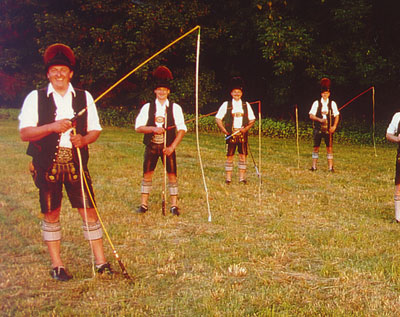 Find something to marvel . . .
Find something to marvel . . .
Find etwas zu staunen . . .This week my words were more abstract and dealing with ideas of holiness and mystery. Two great tastes that taste great together (
Zwei gute Geschmäcker, die zusammen gut schmecken).
To clarify, I think a mystery is anything that encourages someone to ascend to a place they don't understand with a sense of wonder. Entering into a conversation with Mystery and with friends is what brings us together into a harmonious existence.
Who are your friends? If you look, we like to surround ourselves with people who are amazed with life and are inspired by how fresh existence is.
Amaze is one of those great overused words. This about it, if we are
amazed with life, that means we've realized we are in the
maze of life. This labyrinthine life of ours twists and turns and
amazing friends show us (aufzeigen) that life is not so simple, but that it's beautifully intricate and artfully crafted.
If we pass on anything to our friends, families, and future generations, it should be a sense of wonder, which means a sense that life is worth pondering. We work, we play, we do all sorts of activities, but in the end we need to pass down that we're built to contemplate. We are built to wander and wonder in this maze with our fellow contemplators (friends), enjoy it until the golden thread leads us out, because it is indeed a beautiful bewilderment.
Wörter
I. die Vergnügung: pleasure
II. das Geheimnis: mystery
III. der Zusammenklang: Harmony
IV. die Überlieferung: tradition or lore
V. die Wahrnehmung: Perception
VI. die Seligkeit: blessedness
Verben
I. ersetzen (ersetzte, ersetzt): to exchange
II. reden (redete, geredet): discourse
III. etw. an jmdn. weitergeben (gab weiter, weitergegeben): to pass something down to someone
IV. aufzeigen (zeigte auf, aufgezeigt): To demonstrate something
V. sich verlieren (verlor, verloren): to wander off, to be lost.
VI. jmd./etw. werden (wurde/ward, geworden): to become something
Der Abstaz
Nimmst du
Vergnüngung wann du mit einem
Geheimnis redest? Seit dem Anfung, haben Leute die
Überlieferung des Geheimnnisse
weitergegeben. Philosophen und Theologen haben
Wahrnehmungen über den Geheimnissen unseres Lebens
ersatz. Warum bin ich hier? Wer bin ich? Wie kann ich gut leben? Die Unterhaltung* der Frage bringt verschiedene Leute im
Zusammenklang, weil sie Wahrheit und Klarheit** zu
aufzeigen hoffen. Deshalb kann man eher sich finden als
sich verlieren. Zusammenklang gibt den Leute die
Seligkeit, die
sich werden kann. Sie kann man heiliger, weiser, und fröhlicher werden. Wenn man mit Geheimnis redet, kann er Vergnüngen haben, weil es man eine neue Wahrnehmung gibt.
*Conversation
**Truth and Clarity
Wörter
I. die Vergnügung: pleasure
II. das Geheimnis: mystery
III. der Zusammenklang: Harmony
IV. die Überlieferung: tradition or lore
V. die Wahrnehmung: Perception
VI. die Seligkeit: blessedness
Verben
I. ersetzen (ersetzte, ersetzt): to exchange
II. reden (redete, geredet): discourse
III. etw. an jmdn. weitergeben (gab weiter, weitergegeben): to pass something down to someone
IV. aufzeigen (zeigte auf, aufgezeigt): To demonstrate something
V. sich verlieren (verlor, verloren): to wander off, to be lost.
VI. jmd./etw. werden (wurde/ward, geworden): to become something
 Being a theologian I admit, I do love the realm of religious classical music: Bach is bombastic, Byrd is mezmorizing, Pärt is like Pentecost, and Gregorian Chant is on my playlist for running. But the mortar to my theological life is jazz.
Being a theologian I admit, I do love the realm of religious classical music: Bach is bombastic, Byrd is mezmorizing, Pärt is like Pentecost, and Gregorian Chant is on my playlist for running. But the mortar to my theological life is jazz.



















